A group of scientists sighted at least nine vaquita marina porpoises in the upper Gulf of California in late 2021, leading the chairman of the Sea Shepherd Conservation Society (SSCS) to declare that there is still hope for the critically endangered species.
During a five-day period in October and November, scientists on board the Sea Shepherd vessel Sharpie and another boat that belongs to the Whale Museum in La Paz sighted eight mature vaquitas and one or two calves in a 225-square-kilometer no-fishing zone known as the zero tolerance area (ZTA).
Vaquitas, the world’s smallest porpoise species, are endemic to the Gulf of California, where many have died after becoming entangled in nets set to catch totoaba, a fish whose swim bladder is a delicacy in China and sells for thousands of dollars per kilogram.
Vaquita numbers have declined significantly in recent decades. According to estimates by the International Committee for the Recovery of the Vaquita, numbers declined to 254 in 2008 from 567 in 1997. By 2018, estimated numbers had dropped to just 22, while there have been estimates as low as 10 more recently.
In a recent interview with the newspaper Milenio, Sea Shepherd chairman Pritam Singh said there could be more than eight mature vaquitas in the Gulf of California, but that was the number scientists were able to count.
“The good news is that the vaquitas are here and the better news is that these actions that are being taken now are very effective and that’s where the hope comes in,” he said while on board a naval vessel.
The SSCS is collaborating with the Mexican navy to protect the vaquita by assisting the removal of illegal fishing nets inside the ZTA.
“In early January 2022, Sea Shepherd and the Mexican navy began a new reporting and response protocol in the zero tolerance area,” the society said in a statement Tuesday. “… This enhanced protocol has led to a substantial reduction in the number of fishing vessels in the ZTA.”
Singh said that the sighting of eight mature vaquitas and one or two calves didn’t necessarily indicate an increase or decrease in the population of the endangered porpoise. He noted that locating vaquitas within the gulf can be difficult and that sighting efforts can be impeded by poor weather.
Sea Shepherd vessels began vaquita protection patrols in the upper Gulf of California in 2015. However, the organization stopped patrols for a period due to attacks by fishermen. One fisherman died after he was injured in an attack on two SSCS vessels on December 31, 2020.
Sea Shepherd last year reached an agreement with the navy to carry out joint patrols in order to avoid confrontations with vessels fishing illegally for totoaba in the ZTA.
“Right now is the totoaba season and that’s why we’re here in this area,” Octavio Carranza, Sea Shepherd director of ship operations, told Milenio. “The problem is that vaquitas get tangled up in the totoaba nets, … that’s why we’re here 24 hours a day.”
Singh said that through the collaboration with the navy, “we’re improving the vaquitas’ chances of survival.”
“The effectiveness of this plan and the effectiveness of the resources put here has resulted in a dramatic reduction in the threats to the vaquita, which is the time that the nets are in the water and how many nets are in the water,” he said.
The SSCS has removed over 1,000 fishing nets from the upper Gulf of California since 2015, but it is no longer permitted to do so, leaving the navy to do that work.
According to Rear Admiral José Carlos Tinoco Castrejón, 70 illegal fishing nets have been removed this year, while 172 were taken out of the water in 2021.
The navy and other federal authorities, including environmental protection agency Profepa and the National Aquaculture and Fisheries Commission, also carry out inspections on land to ensure that fishing boats entering the gulf have the required fishing permits.
With reports from Milenio
